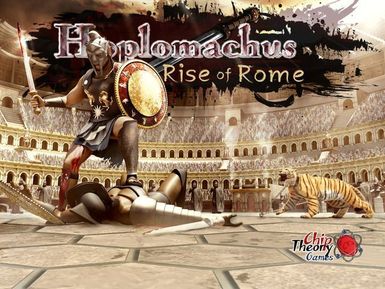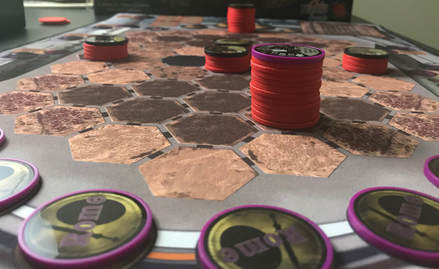 What is this game about? Like its predecessor, Hoplomachus: The Lost Cities, Hoplomachus: Rise of Rome is a game in which gladiators fight it out in the arena for victory and for the favor of the crowd. Rise of Rome is a standalone game, but if you have the original, all of the cities are fully compatible with both games. This gives you plenty of opportunities to mix and match. Players once again fight to protect their champion while eliminating an opponent's, using less powerful but very helpful support gladiators to attack, defend, and use battle tactics. The game is played out on a large neoprene arena where gladiators—represented by lovely poker chips—vie for tactical dominance. Each gladiator attacks with a unique combination of dice, and different colored dice have different odds of scoring a hit. Rise of Rome uses essentially the same combat system as The Lost Cities, but it does have a different way of earning crowd favor. Rather than racing up a linear crowd favor track, players can instead move up multiple different pathways to claim tactics. After all tactics have been claimed, it's time to race for a fancy new gladiator. There are also some different types of terrain that give you something new to deal with/exploit during battle. How does it play solo? Hoplomachus: The Lost Cities had a relatively simple AI system that allowed players to battle against arena beasts and bosses. Rise of Rome offers something new: Titans. While the enemy movements and attacks were relatively predictable in Lost Cities, Rise of Rome offers challenging opponents are more complicated and demand more complicated strategies. This does mean that there is a bit more bookkeeping—the AI in The Lost Cities was simpler, but it was also a lot simpler to operate. All the same, I think Rise of Rome is a fantastic addition because it offers a totally different and more advanced challenge for solo gamers.  Hadrian of Rome challenges a boss from The Lost Cities on the first game's playmat. The Lost Cities and Rise of Rome are compatible with each other. Hadrian of Rome challenges a boss from The Lost Cities on the first game's playmat. The Lost Cities and Rise of Rome are compatible with each other. Overall Thoughts I am a fan of Hoplomachus as a whole, and I think Rise of Rome is an awesome addition to the series. The Titans contribute a lot to the solo game, and in many ways are more satisfying than the AI from the first game (although I still play Lost Cities in solo mode because sometimes simple is good). However, Rise of Rome includes only two cities, and as a result might be a bit less satisfying as a standalone game. (Hoplomachus: The Lost Cities included three cities: Atlantis, El Dorado, and Xanadu.) In the end, I think that Lost Cities and Rise of Rome really need each other to fully shine. They also both mix very well with the smaller expansions that Chip Theory Games has published for the series. Do I recommend it? Absolutely. Hoplomachus is among my top games. I have nothing against "beat your own score" games, but I love solo games with interesting AI to fight against. Hoplomachus: Rise of Rome has very interesting AI opponents to fight with, and that really does it for me. I'm interested in Hoplomachus. Where should I start? I think you have two options when getting started with Hoplomachus. In my opinion, for gameplay purposes, it is best to start with The Lost Cities and then work your way through the games in order of their release, meaning you'd move on to Rise of Rome and then to Origins. However, if you want a smaller, faster, cheaper game before you commit, then you ought to start with Hoplomachus: Origins. The solo trials are awesome and you will love it. But honestly, if you start with Rise of Rome, you'll like that one too. This is a fantastic set of games. Overall Rating: 4 stars (5 stars when combined with Hoplomachus: The Lost Cities) Rating Scale: 5 stars — I love it! 4 stars — I really like it. 3 stars — I like it. 2 stars — It's OK. 1 star — Meh.
1 Comment
|
AuthorMy name is Liz Davidson, and I play solo board games. A lot of solo board games... Archives
August 2021
Categories
All
|
 RSS Feed
RSS Feed